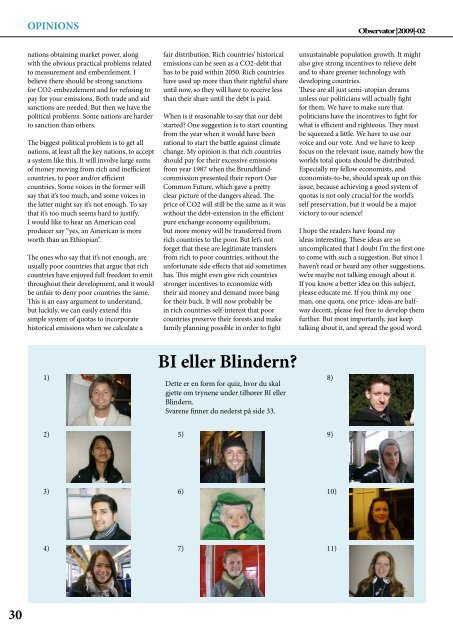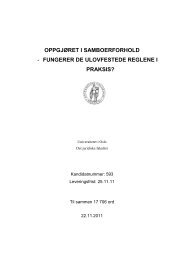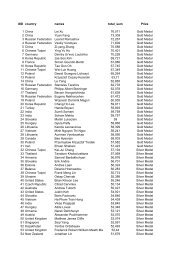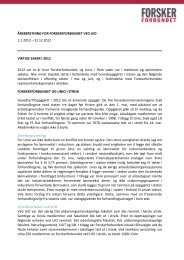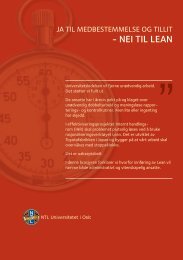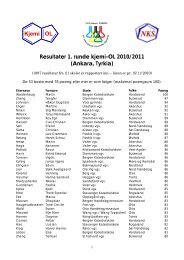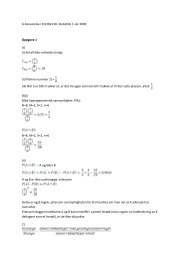2009:2 - Universitetet i Oslo
2009:2 - Universitetet i Oslo
2009:2 - Universitetet i Oslo
- No tags were found...
Create successful ePaper yourself
Turn your PDF publications into a flip-book with our unique Google optimized e-Paper software.
OPINIONSObservator |<strong>2009</strong>|-02nations obtaining market power, alongwith the obvious practical problems relatedto measurement and embezzlement. Ibelieve there should be strong sanctionsfor CO2-embezzlement and for refusing topay for your emissions. Both trade and aidsanctions are needed. But then we have thepolitical problems. Some nations are harderto sanction than others.The biggest political problem is to get allnations, at least all the key nations, to accepta system like this. It will involve large sumsof money moving from rich and inefficientcountries, to poor and/or efficientcountries. Some voices in the former willsay that it’s too much, and some voices inthe latter might say it’s not enough. To saythat it’s too much seems hard to justify.I would like to hear an American coalproducer say “yes, an American is moreworth than an Ethiopian”.The ones who say that it’s not enough, areusually poor countries that argue that richcountries have enjoyed full freedom to emitthroughout their development, and it wouldbe unfair to deny poor countries the same.This is an easy argument to understand,but luckily, we can easily extend thissimple system of quotas to incorporatehistorical emissions when we calculate afair distribution. Rich countries’ historicalemissions can be seen as a CO2-debt thathas to be paid within 2050. Rich countrieshave used up more than their rightful shareuntil now, so they will have to receive lessthan their share until the debt is paid.When is it reasonable to say that our debtstarted? One suggestion is to start countingfrom the year when it would have beenrational to start the battle against climatechange. My opinion is that rich countriesshould pay for their excessive emissionsfrom year 1987 when the Brundtlandcommissionpresented their report OurCommon Future, which gave a prettyclear picture of the dangers ahead. Theprice of CO2 will still be the same as it waswithout the debt-extension in the efficientpure exchange economy equilibrium,but more money will be transferred fromrich countries to the poor. But let’s notforget that these are legitimate transfersfrom rich to poor countries, without theunfortunate side effects that aid sometimeshas. This might even give rich countriesstronger incentives to economize withtheir aid money and demand more bangfor their buck. It will now probably bein rich countries self-interest that poorcountries preserve their forests and makefamily planning possible in order to fightunsustainable population growth. It mightalso give strong incentives to relieve debtand to share greener technology withdeveloping countries.These are all just semi-utopian dreamsunless our politicians will actually fightfor them. We have to make sure thatpoliticians have the incentives to fight forwhat is efficient and righteous. They mustbe squeezed a little. We have to use ourvoice and our vote. And we have to keepfocus on the relevant issue, namely how theworlds total quota should be distributed.Especially my fellow economists, andeconomists-to-be, should speak up on thisissue, because achieving a good system ofquotas is not only crucial for the world’sself preservation, but it would be a majorvictory to our science!I hope the readers have found myideas interesting. These ideas are souncomplicated that I doubt I’m the first oneto come with such a suggestion. But since Ihaven’t read or heard any other suggestions,we’re maybe not talking enough about it.If you know a better idea on this subject,please educate me. If you think my oneman, one quota, one price- ideas are halfwaydecent, please feel free to develop themfurther. But most importantly, just keeptalking about it, and spread the good word.1)BI eller Blindern?Dette er en form for quiz, hvor du skalgjette om trynene under tilhører BI ellerBlindern.Svarene finner du nederst på side 33.8)2)5)9)3)6) 10)4)7)11)30


